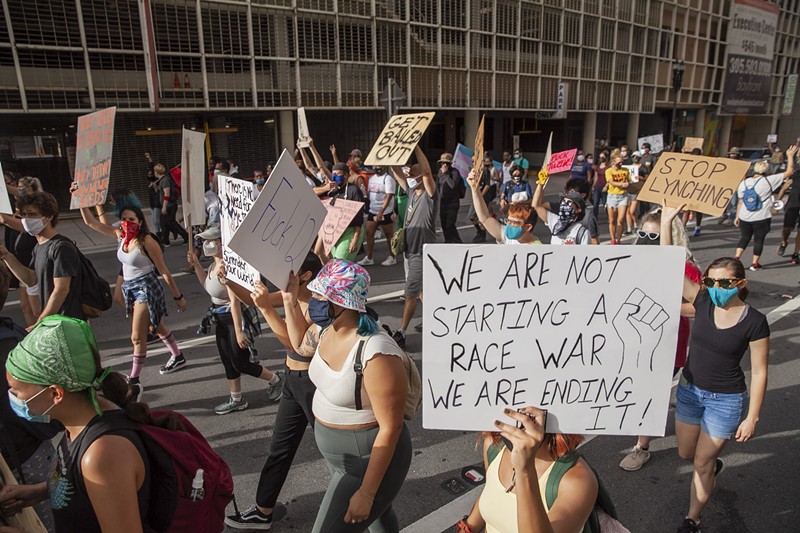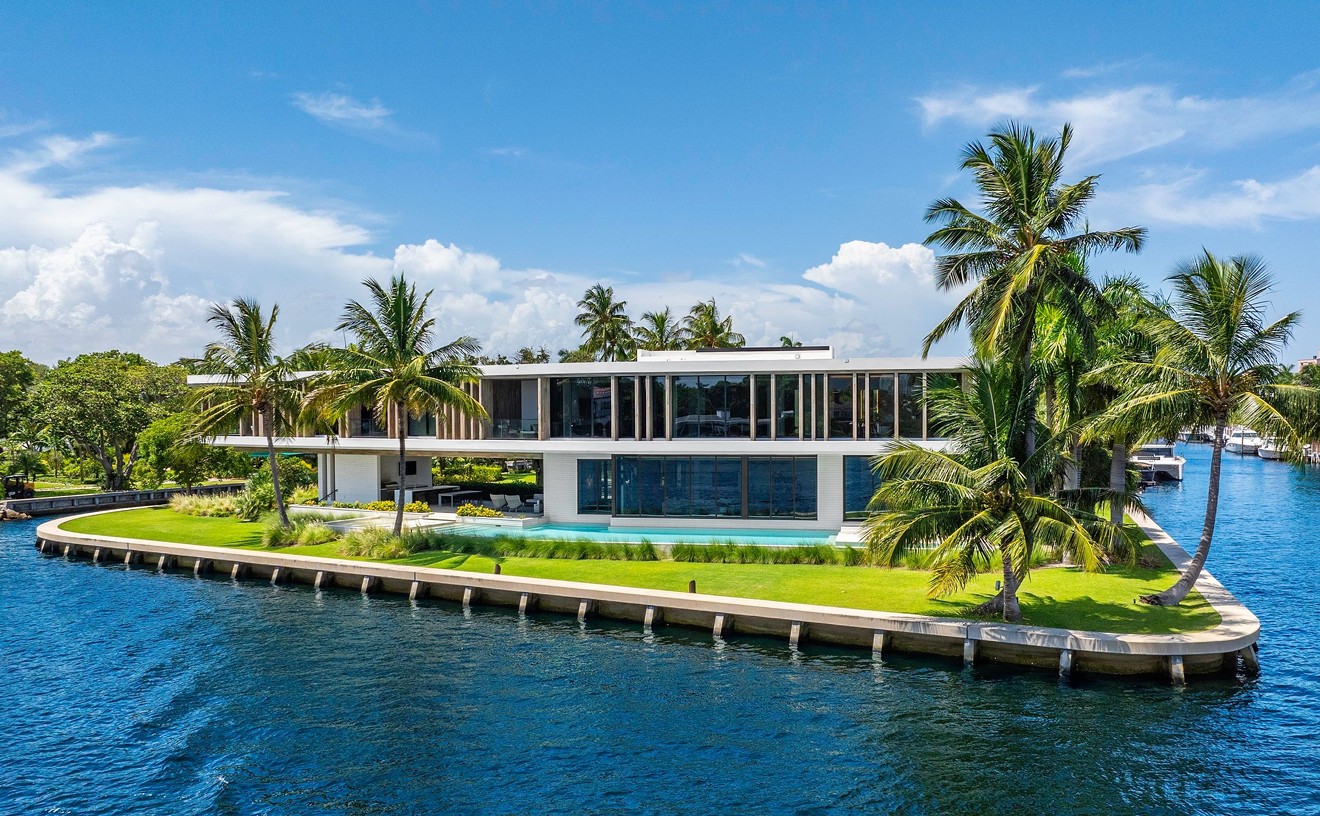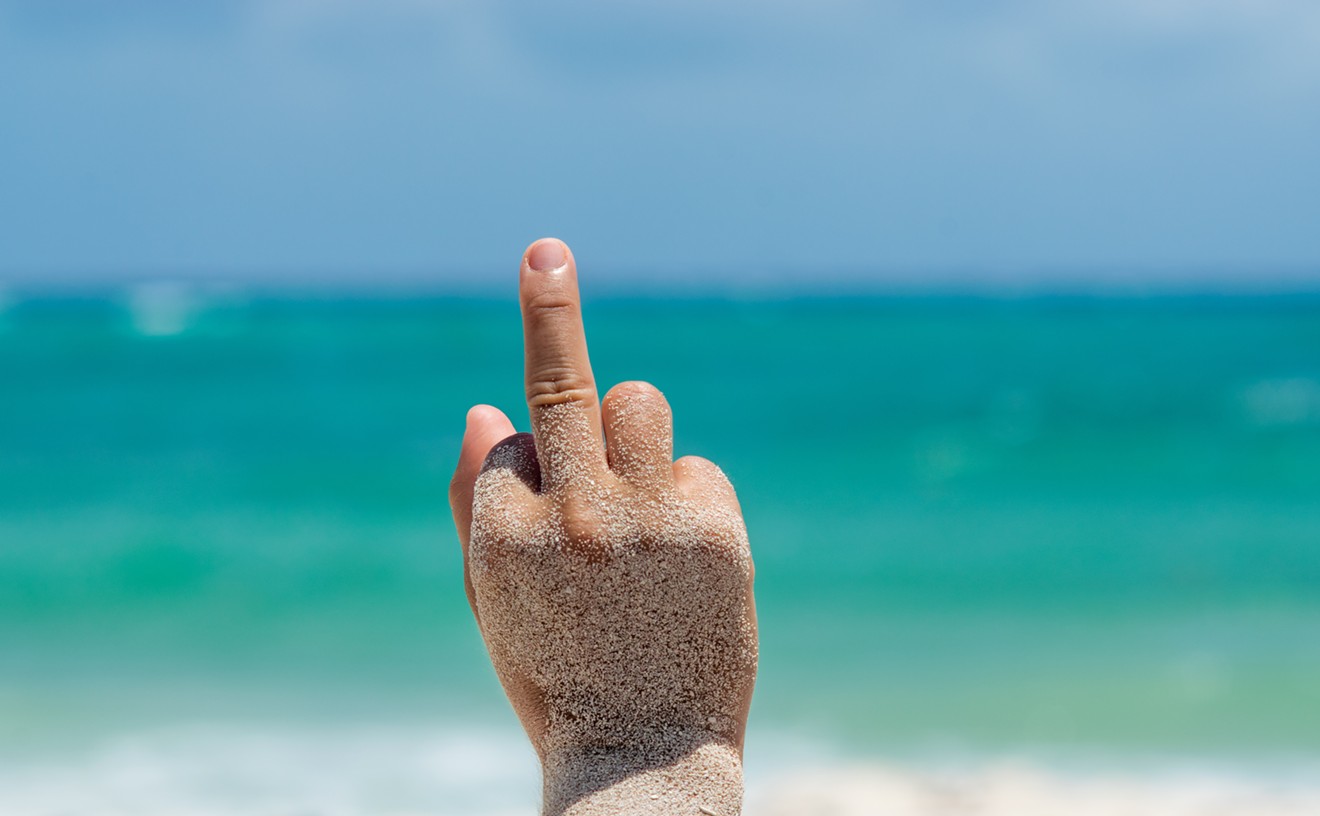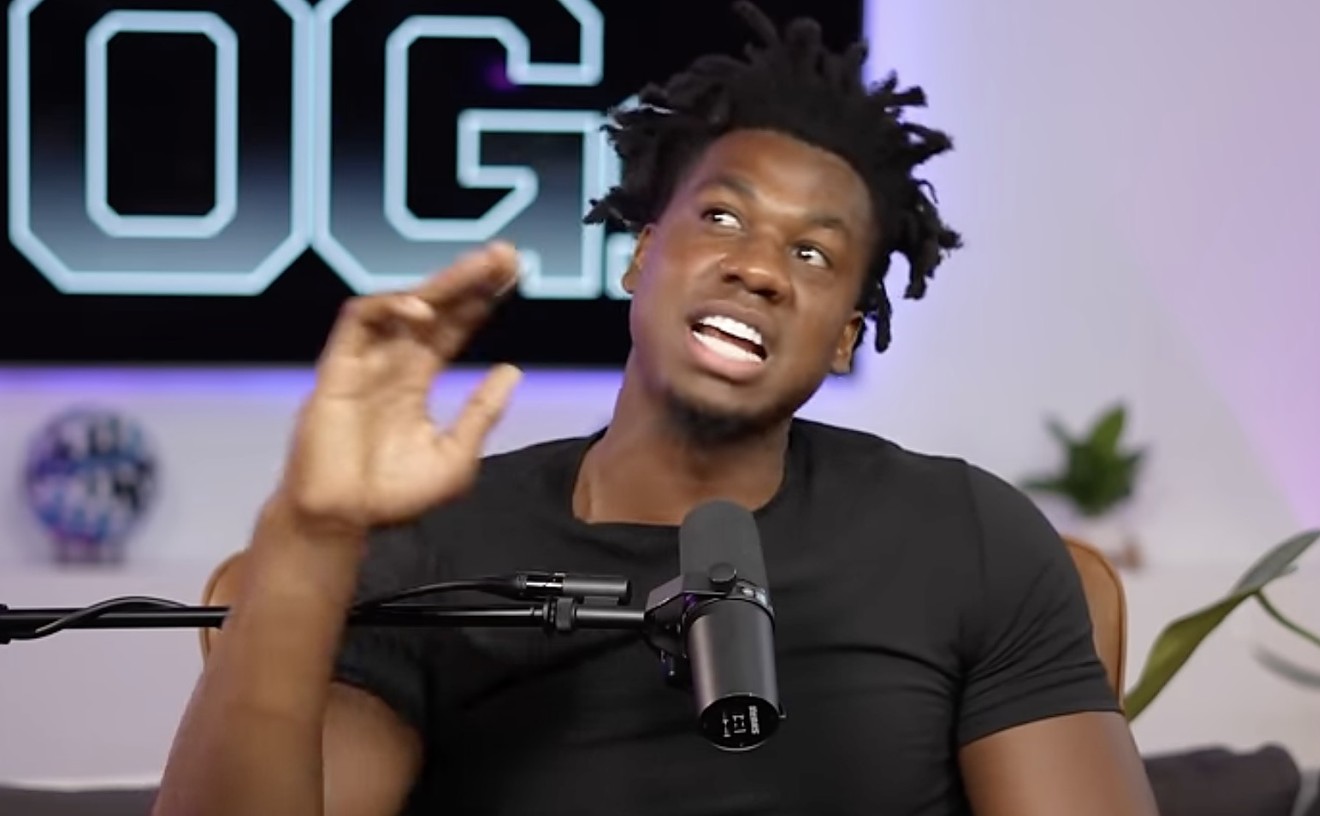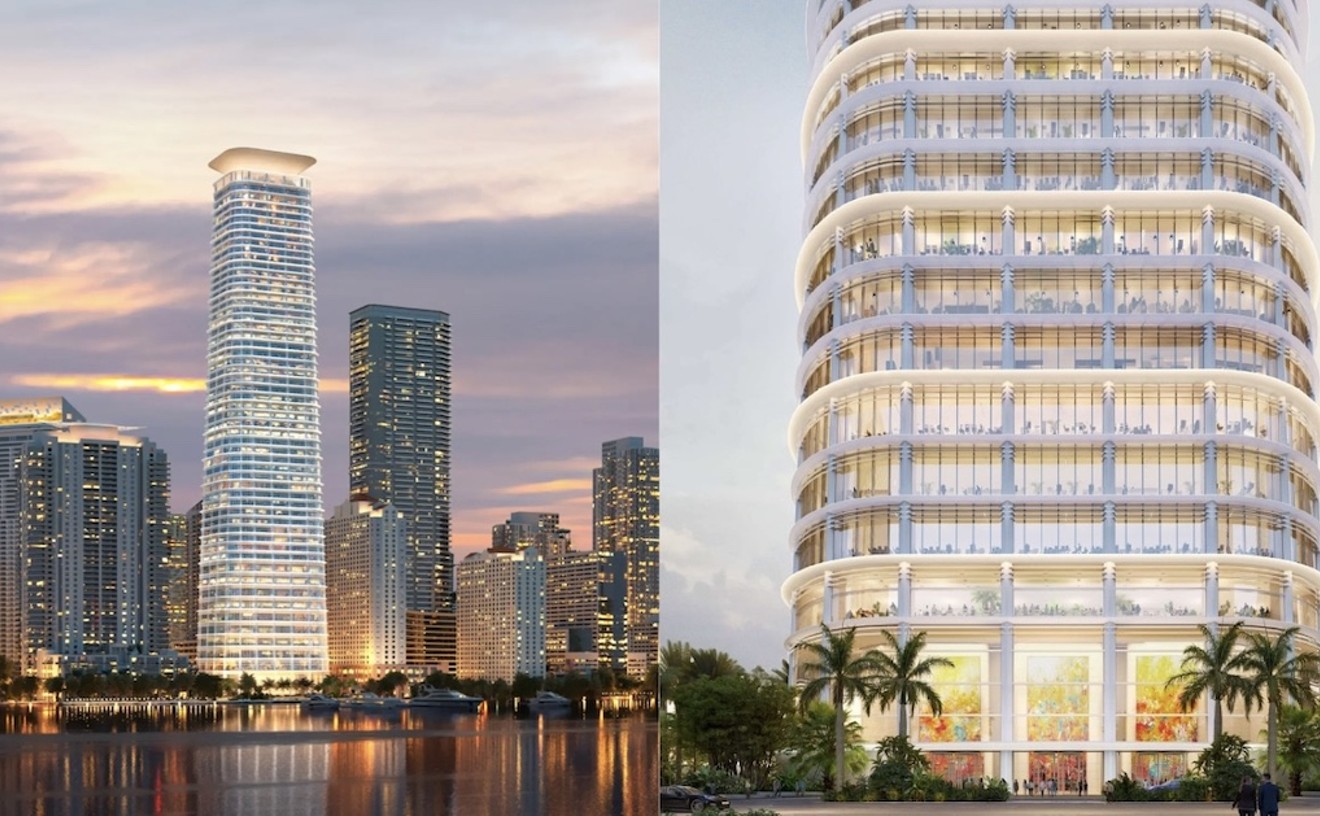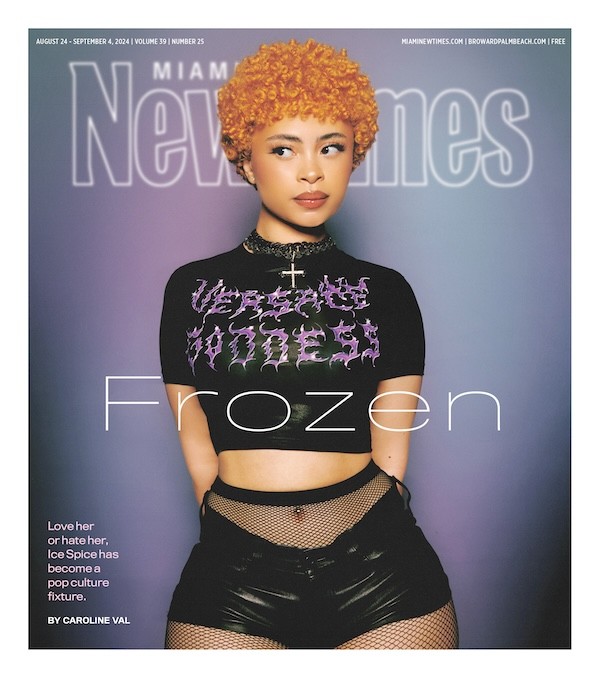They met at the Torch of Friendship, which has become the protesters' home base, on Sunday and planned to march to the City of Miami Police Department's headquarters about a mile west and then return to the Torch.
The protesters made it about halfway before encountering several police cruisers as they approached North Miami Avenue and Sixth Street.
"I realized we had cops behind us and in front of us on the street," said Kristine Padgett, one of the Sunday protesters. "That’s when I was like, 'Oh no, this is bad. We're gonna have a problem.'"
Padgett and more than 30 others were arrested that day on a misdemeanor charge of obstruction of a public street, highway, road, or sidewalk. Two protesters also face a misdemeanor charge of resisting arrest without violence, arrest reports show.
In nearly identical narratives, arresting officers wrote in their reports that they responded to the intersection of North Miami Avenue and Sixth Street and arrested the demonstrators because they were "protesting in the middle of the street and blocking the regular flow of vehicular traffic." The reports mention no use of force on the part of officers, but several protesters described to New Times a chaotic scene of aggressive, sometimes violent, arrests during an otherwise peaceful march.
Officer Kiara Delva, a Miami police spokesperson, said in an email that before protesters were arrested, they were "given opportunities to retreat by relocating to the sidewalk to continue what would have been a peaceful protest." Issuing civil citations in lieu of arrest, Delva said, "would not have resolved the issue."
"Roadways, public streets, highways, etc are not to be obstructed or blocked as it can be detrimental to those very same individuals placing themselves in harm's way while motorists attempt to commute to and from their destinations," Delva said.
Several protesters told New Times that some people walked in the street to cross intersections, to take a detour around a construction site, or if there was no traffic.
Ranger, a longtime organizer who asked to go by the pseudonym he uses at protests, said demonstrators won't take the streets or disrupt traffic if the group is smaller than 100 people. The official headcount for Sunday's march, he said, was close to 70. He described one scenario in which protesters walked on a street for a short stretch of their route to avoid getting too close to outdoor diners at a restaurant with tables set up on the sidewalk. But Ranger said there was no purposeful obstruction of traffic or road-blocking during the protest.
"That was not the plan for Sunday," he said. "Everyone understood that was not the plan. We made sure as many people as possible stayed on the sidewalk."
Ranger and Padgett told New Times that as they approached North Miami Avenue and Sixth Street and saw the police cruisers, they heard an officer use the cruiser's megaphone to say he wanted to get in front of them so they could follow and continue to march safely.
The protesters gathered on a sidewalk to comply with the officer, but they received no other orders, according to Padgett and Ranger. More cruisers arrived and blocked off the area, and before long, the protesters said, the officers started going after them.
Ranger said protesters will sometimes hug each other in clashes with police as a personal de-escalation technique.
"The moment protesters started doing this, police were peeling them off from each other and slamming them on the ground," Ranger said.
Padgett, who's a designated medic during protests, was recording the arrests from a sidewalk across the street, but she said her camera was taken into evidence and is still at the police department. She crossed the street when she started seeing officers "yanking" protesters around, throwing them from the sidewalk onto the street and from the street onto the sidewalk. When officers corralled protesters in front of a building and pushed them against a wall, Padgett said, she told the group to stay against the wall and sit down. She said she told them: "We're going with the police. That's just what's going to happen."
"And as they were trying to sit with their hands up, police continued to pick them up off their knees, grabbing them from the sidewalk, and throwing them into the roadway," Ranger said.
Another protester who was taken into custody, Gabrielle Clark, recorded the arrests, as well. She said she was shooting live video on Instagram when six officers rushed her and pushed her against the wall, yelling for her not to resist. Her camera and cell phone were taken as evidence and remain in police custody, she said.
Clark was previously arrested on a charge of obstructing traffic during a July 13 protest marking the fourth month since the killing of Breonna Taylor, a Black emergency-medical technician shot to death in her home by three Louisville police officers. Clark said she knew she would likely get arrested during that protest; she and four other female demonstrators were trying to make a statement about protesters being arrested and not the officers who shot Taylor. But on Sunday, she said she didn't want to take any risks and get arrested a second time.
Clark and Padgett said they made sure to stay on sidewalks and to only walk on the street at an intersection or when it was otherwise necessary. Still, police arrested everyone.
When Clark, Padgett, and Ranger were handcuffed with zip ties and placed in the back of their respective police cruisers, they repeatedly asked why they were being arrested and on what charges. They were largely ignored. The protesters said they were later told by their arresting officers that they didn't know why the protesters were being arrested, but that they were following orders.
The protesters sat in police cruisers outside the Miami Police Department for several hours before being taken to Turner Guilford Knight Correctional Center near Miami International Airport. Members of local protest groups waited outside the jail for hours until everyone was released. The groups raised money to pay for all of the protesters' bail.
Clark, Padgett, and Ranger said they worry the mass arrests will have a chilling effect and discourage Miami protesters from returning.
Padgett said protesters have been showing up to the Torch of Friendship every day for nearly three months, and plenty of people, herself included, intend to continue. Protests and marches take place every day from 5 to 8 p.m., and anyone is welcome.
"The fear of getting arrested is not what's going to stop me," Padgett said. "It made me more angry and made me realize why we need to be out there and making a fuss, because this isn't right."
Clark said she's taking a few days before returning to the protests because she's scared. She knows her first arrest was justified, but she said the second one felt like a punishment for exercising her right to assemble.
"These are real charges that will follow me," she said. "It's scary that it doesn't matter whether you're breaking laws or not breaking laws, they will arrest you."
She said she joined the protests two weeks ago and photographs all the events to combat any false narratives that might arise from them.
"I want everybody to know that this movement and this group, we don't hate cops," Clark said. "We hate how the system is set up, and we just want change. We're not fighting with violence, and we're not fighting with hate. All we're trying to do is change the world and create a system that works for everybody, not just some. We want accountability and justice."

